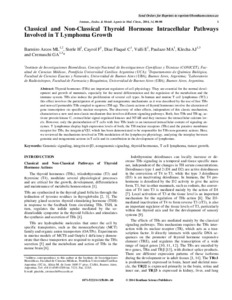Por favor, use este identificador para citar o enlazar este ítem:
https://repositorio.uca.edu.ar/handle/123456789/14054| Título: | Classical and non-classical thyroid hormone intracellular pathways involved in T lymphoma growth | Autor: | Barreiro Arcos, María Laura Sterle, Helena Andrea Cayrol, María Florencia Díaz Flaqué, María Celeste Valli, Eduardo Paulazo, Maria Alejandra Klecha, Alicia Juana Cremaschi, Graciela A. |
Palabras clave: | GLANDULA TIROIDES; HORMONAS; TUMORES; LINFOMA DE CELULAS T | Fecha de publicación: | 2014 | Editorial: | Bentham Science Publishers | Cita: | Barreiro Arcos, M.L. Classical and non-classical thyroid hormone intracellular pathways involved in T lymphoma growth [en línea]. Immunology, Endocrine & Metabolic Agents in Medicinal Chemistry. 2014, 14 doi:10.2174/187152221501150710125255 Disponible en: https://repositorio.uca.edu.ar/handle/123456789/14054 | Resumen: | Abstract: Thyroid hormones (THs) are important regulators of cell physiology. They are essential for the normal development and growth of mammals, especially for the neural differentiation and the regulation of the metabolism and the immune system. THs also induce the proliferation of several cell types. In human and murine T cell lymphomas (TCL) this effect involves the participation of genomic and nongenomic mechanisms as it was described by the use of free THs and non-cell permeable THs coupled to agarose (TH-ag). The classic actions of thyroid hormones involve the alteration of gene transcription via specific nuclear receptors. The discovery of other effects, independent of this classic mechanism, characterizes a new and non-classic mechanism that involves different signaling pathways. Both, free THs and TH-ag, activate protein kinase C, extracellular signal-regulated kinases and NF-kB and they increase the intracellular calcium levels. However, only the preincubation of T cells with free THs leads to an increased intracellular content of signaling enzymes. T lymphomas display high expression levels of both, the TH nuclear receptors (TRs) and the putative membrane receptor for THs, the integrin V3, which has been demonstrated to be responsible for THs non-genomic actions. Here, we reviewed the mechanisms involved in THs modulation of the lymphocyte physiology, analyzing the interplay between genomic and nongenomic actions in T cells and its contribution in the development of lymphomas. | URI: | https://repositorio.uca.edu.ar/handle/123456789/14054 | ISSN: | 1871-5222 (impreso) 1875-6115 (online) |
Disciplina: | MEDICINA | DOI: | 10.2174/187152221501150710125255 | Derechos: | Acceso abierto | Fuente: | Immunology, Endocrine & Metabolic Agents in Medicinal Chemistry. 2014, 14 |
| Aparece en las colecciones: | Artículos |
Ficheros en este ítem:
| Fichero | Descripción | Tamaño | Formato | |
|---|---|---|---|---|
| cassical-non-classical-thyroid.pdf | 164,05 kB | Adobe PDF |  Visualizar/Abrir |
Visualizaciones de página(s)
46
comprobado en 27-abr-2024
Descarga(s)
36
comprobado en 27-abr-2024
Google ScholarTM
Ver en Google Scholar
Altmetric
Altmetric
Este ítem está sujeto a una Licencia Creative Commons

